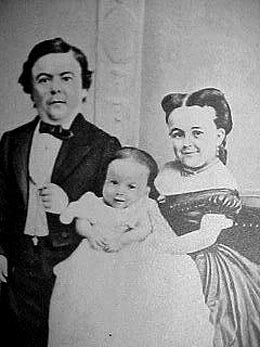On June 23 and 24, 1892, Lavinia Warren (1841-1918), who performs as "Mrs. Tom Thumb," and her "celebrated troupe of dwarfs" are in Seattle for four performances. Mrs. Thumb, Count Magri and his twin brother, Baron Magri, and a number of other "Lilliputians" along with some taller people present two musical sketches at the Seattle Opera House. Warren is just 32 inches tall.
The General and the Count
In 1862, Lavinia Warren was hired by P. T. Barnum to perform in New York City at his American Museum, a museum that exhibited a collection of curiosities. The following year she married the 40-inch-tall dwarf General Tom Thumb, the stage name of Charles Stratton (1838-1883), who had begun working for Barnum in 1842 and adopted "Mrs. Tom Thumb" as her stage name. In 1885, two years after General Tom Thumb died of a stroke, Warren married Count Primo Magri, an Italian midget. She retained her original stage name after she married the Count.
Mrs. Tom Thumb, Count Magri, and his twin brother, Baron Magri, and a number of other Lilliputians along with some taller people presented two musical sketches at the Seattle Opera House located at 4th Avenue on the southwest corner of Jefferson Street. The sketches were The Rivals and Gulliver Among the Lilliputians which combined music, comedy, dancing, and pantomime.
The taller members of the cast were Victor Lee, a sleight-of-hand performer or juggler and mesmerizer, and Charles H. Clark and Florence McMahon, singers. At one point in the performance, Warren rode onto stage in a miniature carriage, pulled by miniature ponies, that had been presented to her by British Queen Victoria. One reporter wrote that her "dresses are rich and beautiful and the number of diamond ornaments that weigh her down would arouse the envy of a pawnbroker's wife ... The little lady sings and talks in a piping voice, her tiny mouth being scarce large enough to emit the sounds clearly" (Seattle Press-Times). After the matinee on June 24, all were invited to a reception, where they could meet the "Lilliputians" and shake their hands.

